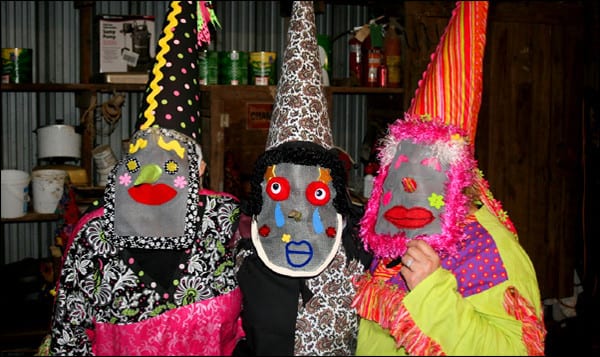
Today is "Fat Tuesday", the last of Mardi Gras celebrations before Lent, and National Public Radio (NPR) has poignantly posted a reminder of the lesser known events that sometimes get lost among the French Quarter. In aggregate, ancillary events can be as profitable as the big marquee events, sometimes, even more profitable.
Courir de Mardi Gras
Of myriad Mardi Gras events, NPR's Debbie Elliot puts the spotlight on ones that may not garner the most attention, but have a history, and pedigree, on par with the events on Bourbon Street. One such event is Courir de Mardi Gras ("rual Mardi grass run") held each year in southwest Louisiana. The family friendly tradition taps in to the medieval practice of villagers going door-to-door to gather the ingredients for a community meal. Elliot describes what Courir de Mardi Gras is like in 'Mardi Gras Merriment Beyond Bourbon Street Festivities':
Led by a flag-bearing capitaine, this colorful and noisy procession of masked and costumed men on horses and wagons go from house to house in the countryside asking for charity in return for a performance of dancing and buffoonery...
Once the team has chased enough chickens to fill enough pots to feed the town, the gumbo feast is on. Dancing, singing and a bit of drinking ensue.
While not a ticketed event, Courir de Mardi Gras is very representative of an activity that is part of a local fair, fundraiser or food drive. The comfort of community enables neighbors to journey away from the main event, into "extracurricular" activities at homes and business nearby.
Zulu Social Aid and Pleasure Club
Closer to New Orleans, but still considered ancillary events, are post-parade private parties that have been a tradition since the city first began celebrating Mardi Gras in 17th century. Originally, the parties were invitation-only, high society galas, which required knowing the right people in order to be allowed to attend. A handful still operate in the word-of-mouth manner, but most are now ticketed, public events. Post-parade parties range from intimate gathering among friends to huge block-parties with celebrity guests and big name music acts.
An example of a ticketed ancillary event is the Zulu Social Aid and Pleasure Club's Lundi Gras. Zulu hosts several ancillary events during the two-weeks of Mardi Gras, but Lundi Gras is the most popular. The event is a day long celebration of music and community spirit which starts early in the morning on Fat Tuesday and run all day long. Of note, Zulu sells VIP tickets for the post-parade arrival of the Lundi Gras king and queen.
Although not as well know as some of the marquee post-parade parties, Zulu makes the most of its event's relatively small size by being part of a network of events that compliment, but not conflict, with each other. A complete list of Fat Tuesday ancillary events was available on nola.com.
Ticketing software for ancillary events
Previous ThunderTix blog posts have made mention of the aggregate value inherent in ancillary events. Combined, a string a smaller events can be as successful, and profitable, as the main event which they are supporting. In finance this is known as the long tail effect and has proven to be a very lucrative strategy.
If you are an event planner for a major event, consider cultivating a network of smaller ancillary events in the same general vicinity of the major one. Depending on your event's brand name recognition, you may be able to offset some of your production costs by licensing your event's name to the smaller events. You may also make ancillary events part of the your main event's ticketing with an "all access" pass.
ThunderTix has the tools to help you sell tickets to a big marquee event as well as lesser know supporting events. Our technology is in use by some of the largest events in North America as well as some of most exclusive ones. If you would like to learn more about how we can help you coordinate ticketing for multiple events, as well as lower your costs, please contact us.